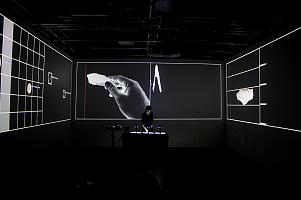MSc
User Experience Engineering
Content navigation menu
Why study MSc User Experience Engineering at Goldsmiths
This innovative programme will explore how people experience the world, particularly when using technology. You'll learn how each layer of technology, from core hardware through to the way that media is handled, can affect user experience, and gain the skills for researching user requirements and designing the best solutions.
- This specialist Masters degree provides more focused employment possibilities than a more general computing programme.
- This degree consolidates a variety of topics that may be available as short professional courses but provides a clear framework within which to use the UX skills and knowledge while providing sufficient time to think deeply about the underlying UX principles.
- You'll learn to design and produce computing-based systems and solutions that have been validated to meet the functional requirements of users, be accessible and inclusive, and provide users with a satisfying user experience.
- A variety of optional modules in advanced technologies and psychology means you can choose a path that emphasises the career of your choice.
- You will have access to the specialist UX lab with a variety of user-measurement tools such as eye-gaze tracking, muscle movement and brain activity.
- The vocational nature of the programme gives you the option to complete a field study thesis project as an alternative to the conventional academic thesis.
- Through presentation and demonstration of your work, we'll prepare you to enter a field of work characterised by the agile approach and team working within multi-disciplinary cohorts.
- You'll benefit from the expertise of the Department of Computing, as well as drawing on the knowledge of staff in the Department of Psychology and the Institute of Management Studies (IMS).
- Guest lectures and Field Project modules will introduce you to the professional aspects of working as a UX designer, researcher or engineer and hearing from industry professionals will give you an insight into what it's like to work in the field.
Contact the department
If you have specific questions about the degree, contact Dr Tony Russell-Rose.
Length
1 year full-time; 2 years part-time
Entry requirements
An undergraduate degree of at least 2:1 standard in computing, psychology, design or related disciplines, and an interest in and capability for working in interdisciplinary contexts. In exceptional circumstances, outstanding individuals with strong commercial experience may be considered.
Fees
Home - full-time: £12520
Home - part-time: £6260
International - full-time: £18560
Department
What you'll study
You will study the following modules:
| Module title | Credits |
|---|---|
| Computing the User Experience | 15 credits |
| Introduction to UX Research Methods | 15 credits |
| Human Factors | 15 credits |
| UX and the Web | 15 credits |
| Interaction Science | 15 credits |
| Applied Topics and Guest Lectures | 15 credits |
As well as one of the following thesis projects:
| Module title | Credits |
|---|---|
| Academic UX Project | 60 credits |
| or | |
| Field UX Project | 60 credits |
Note about optional modules (if available): The above is indicative of the typical modules offered, but is not intended to be construed or relied on as a definitive list of what might be available in any given year. The module content and availability is subject to change.
Teaching and assessment
Taught sessions and lectures provide overviews of themes, which you are encouraged to complement with intensive reading for presentation and discussion with your peers at seminars. Assessments build on lectures and seminars so you are expected to attend all taught sessions to build your knowledge and understanding of your chosen discipline.
All assessed work is accompanied by some form of feedback to ensure that your work is on the right track. It may come in a variety of forms ranging from written comments on a marked essay to oral and written feedback on developing projects and practice as they attend workshops.
Entry requirements
An undergraduate degree of at least upper second class standard in computing, psychology, design or related disciplines, and an interest in and capability for working in interdisciplinary contexts.
In exceptional circumstances, outstanding practitioners or individuals with strong commercial experience may be considered.
International qualifications
We accept a wide range of international qualifications. Find out more about the qualifications we accept from around the world.
If English isn’t your first language, you will need an IELTS score (or equivalent English language qualification) of 6.5 overall and no element lower than 6.0 to study this programme. If you need assistance with your English language, we offer a range of courses that can help prepare you for postgraduate-level study.
The MSc User Experience Engineering is now almost full for 2024 entry. You are still welcome to apply for 2024, and if we are not able to consider you for 2024 we can hold your application for 2025 entry. Please note, if we are considering you for 2025 you will not receive a decision until the autumn.
How to apply
Apply directly to Goldsmiths using our online application system
Before submitting your application you’ll need to have:
- Details of your academic qualifications
- The email address of your referee who we can request a reference from, or alternatively a copy of your academic reference
- Copies of your educational transcripts or certificates
- A personal statement – this can either be uploaded as a Word Document or PDF, or completed online. Please see our guidance on writing a postgraduate statement
You'll be able to save your progress at any point and return to your application by logging in using your username/email and password.
Find out more about applying.
Fees and funding
Annual tuition fees
These are the PG fees for students starting their programme in the 2024/2025 academic year.
- Home - full-time: £12520
- Home - part-time: £6260
- International - full-time: £18560
If your fees are not listed here, please check our postgraduate fees guidance or contact the Fees Office, who can also advise you about how to pay your fees.
It’s not currently possible for international students to study part-time under a student visa. If you think you might be eligible to study part-time while being on another visa type, please contact our Admissions Team for more information.
If you are looking to pay your fees please see our guide to making a payment.
Funding opportunities
MSc User Experience Engineering European Scholarships - we offer a number of partial fee-waivers for applicants to MSc User Experience Engineering who are applying from one of the 46 Member States of the Council of Europe (excluding UK).
MSc User Experience Engineering Latin America Scholarships - we offer a number of partial fee-waivers for applicants to MSc User Experience Engineering who are applying from Latin America.
Explore the Goldsmiths scholarships finder to find out what other funding you may be eligible for.
Paying your fees
Find out about paying your tuition fees.
If you are a UK student you may be eligible for a postgraduate loan.
Meanwhile our Careers Service can also offer advice on finding work during your studies.
Additional costs
In addition to your tuition fees, you'll be responsible for any additional costs associated with your course, such as buying stationery and paying for photocopying. You can find out more about what you need to budget for on our study costs page.
There may also be specific additional costs associated with your programme. This can include things like paying for field trips or specialist materials for your assignments. Please check the programme specification for more information.
Facilities
In the Department of Computing, we have a great range of labs and facilities.
You will have access to the specialist UX lab with a variety of user measurement tools such as eye-gaze tracking, muscle movement and brain activity.
Careers
Prepare yourself for a career in data science
A user’s experience of technology depends on the design and engineering choices that influence their interactions. Emerging and future technologies will exceed the capabilities available today, so our experts will give you the research skills needed to exploit and design new possibilities for the benefit of users that are fit for the relevant market.
The importance of human-computer interaction and good interface design is increasingly recognised as the key to the future of successful tech development. User-centric software and hardware continue to evolve and are becoming more important in product design as technological breakthroughs drive innovation. The ability to select and implement the appropriate technologies to deliver usable and satisfying solutions will address a current skill shortage and will equip students with in-demand vocational skills.
You will be supported from the start to the finish of this programme in order to understand the different potential career journeys you can follow and to build a portfolio of work to demonstrate your capability to gain employment or freelance work in that area.
Assessment has been designed to facilitate this process through the development of transferable or soft skills. Regular guest lectures from industry support the development of sector knowledge and awareness of different career paths.
Students will be able to graduate into a variety of job titles in the area of User Experience and Interaction Design, including UX Designer, UX Engineer, or UX Researcher. These may be in specialist technology companies (eg Mendix) or in a wide range of large or small companies that use technology in their work (eg IKEA).



